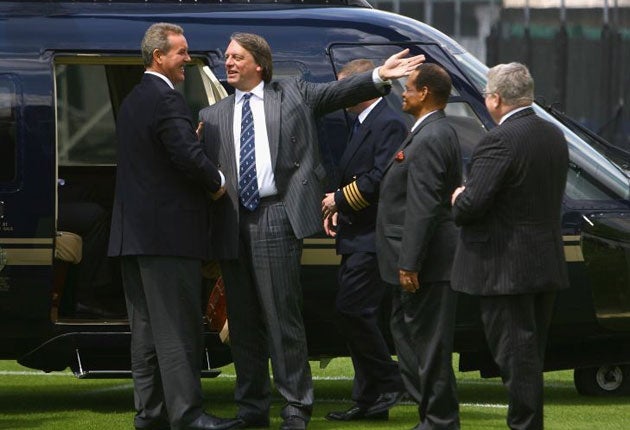Clarke refuses to resign as Stanford is charged
ECB chairman vows to stay on despite case against American billionaire

Giles Clarke, the chairman of the England and Wales Cricket Board, refused to contemplate resignation last night after Sir Allen Stanford, the American banking billionaire with whom the ECB had formed a lucrative but uneasy alliance, had been charged with fraud in the United States.
“I will not be resigning,” said Clarke, after it was put to him that the matter could force him out of office.
He is about to start another two-year term after being unopposed in the election, but both he and the ECB’s chief executive, David Collier, seem certain to come under extreme pressure to consider their positions.
They trumpeted the five-year deal with Stanford as one of unbridled good fortune for English as well as West Indies cricket, but last night Stanford was placed under a temporary restraining order and had his assets frozen after financial regulators in the America accused him of selling $8bn (£5.2m) worth of so-called certificates of deposit guaranteeing improbable and unsubstantiated returns.
Clarke, in Antigua for the third Test between England and the West Indies, said: “We have a situation where a court case has been filed. The matter is therefore sub judice. We also have contractual rights with this particular situation. At the moment all of the obligations with regard to the game that was played have been met and all of the various people who were expected to do various things for that match have received their remunerations as far as I am aware.”
Clarke refused to concede that it was at the least an embarrassment for him and the organisation he leads, but when pressed agreed the relationship with Stanford was at least a cause for regret.
At an impromptu press conference held under a stand at the Antigua Recreation Ground Clarke was clearly nervous but sure of his retention of office.
The ECB has suspended all negotiations with Stanford and it is highly improbable that any more matches will be played under the Stanford umbrella. The board entered a five-year deal with the financier last year, which included a $20m (£14m) annual Twenty20 match in Antigua and a four-team Twenty20 tournament in England each summer. Neither is now likely to take place.
Linda Chatman Thomsen, director of enforcement at the US Securities and Exchange Commission, said: “Stanford and the close circle of family and friends with whom he runs his businesses perpetuated a massive fraud based on false promises and fabricated historical return data to prey on investors.” The regulator went on to say that Stanford “had promised improbable and unsubstantiated high interest rates that were supposedly earned through a unique investment strategy that purportedly allowed the bank to achieve double digit on its investments for the past 15 years.”
In Antigua, the repercussions threaten to be dire. Stanford has had businesses on the island for more than twenty years, employs hundreds of local people and by yesterday afternoon queues were forming outside the bank of Antigua, which he owns.
Stanford arrived in English cricket at Lord’s last summer in a helicopter and was greeted by Clarke and Collier. They fell just short of bowing before him. Stanford then exhibited a trunk containing $20m to show what his team, the Stanford Superstars, and England, would be playing for last November. The match took place but controversy was never far away.
The ECB said it had carried out due diligence on Stanford, and Clarke insisted that there was no indication that anything was wrong. But the ECB must carry out an immediate inquiry into how things went so far.
Stanford’s game plan
* In 2006 the 58-year-old Texan billionaire created and funded a Twenty20 tournament in the Caribbean, spending £16m, including the building of a new stadium.
* Signed £50m contract with Eng-lish Cricket Board for five Twenty20 games over five years, with a prize fund of £10m for each game.
* Series climaxed with £10m match between West Indies XI and England as part of the Super Series.
Join our commenting forum
Join thought-provoking conversations, follow other Independent readers and see their replies
Comments
Bookmark popover
Removed from bookmarks